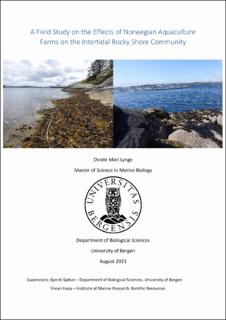| dc.description.abstract | The aquaculture industry has more than doubled since the early 2000s, and the growth is not predicted to stagnate any time soon. Norwegian salmonid aquaculture cages are usually open where waste is flushed from the cage by ocean currents, distributing nutrients and other compounds to the surrounding habitats. Nutrient enrichment can lead to eutrophication of the water masses, which again can have large ecological consequences on the habitat. This study examined if the intertidal communities around Bergen were affected by nearby aquaculture farms. This was done by examining data collected at rocky shores, and modeled values of change in dissolved inorganic nitrogen originating from aquaculture (Δ DIN) at each station retrieved from the NORWECOM model. In addition, three of the intertidal stations were resampled in summer to examine if there were differences in the results due to season. It was found that the intertidal animal community was influenced by Δ DIN, while the algae community was not. Biodiversity, species richness and functional group composition was not significantly driven by Δ DIN. The differences in station biodiversity, species richness, and functional group composition, were not significantly influenced by season, but the animal community, both during spring and summer, was influenced by Δ DIN, supporting my results from the main analysis. As grazing animals have been found to often preferer annual ephemeral algae, grazers have shown to aid as a tool for battling macroalgae blooms driven by nutrient enrichment. This could be the reason for the response in animal community, and not in algae community or biodiversity. More research is needed to figure out the ecological consequence of this change, but this study shows that the intertidal zone should be taken into consideration when deciding how the aquaculture industry should grow in the future. | |
